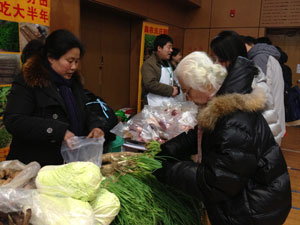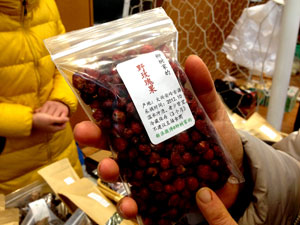Nurturing honest food
Updated: 2013-03-17 07:54
By Han Bingbin (China Daily)
|
||||||||
Organic, healthy and sustainable are the new keywords for a breed of socially conscious consumers and producers in the major cities of China. Han Bingbin reports on back-to-basics food networks.
China is getting richer, but with the wealth comes the accompanying problems of urbanization.
To many, it means grappling with pollution from too many cars and industrial emissions, the loss of agricultural land to city building and an increasing concern about the food they eat.
There is also a nostalgic appetite for the natural flavors from a more simple life in the past.
This nostalgia has fueled a demand for healthier organic food in China, and in the major cities like Beijing, Shanghai and Nanjing, alternative food networks and production chains have emerged in the form of farmland rental, farmers' markets and organic restaurants.
In the capital, one of the most influential networks to have emerged is the Beijing Country Fair, an organic farmers' market that is rapidly gaining recognition among the city's widening strata of middle classes, who are willing to pay more for safer, natural foods without chemical pesticides and additives.
Each week, the market gathers around 20 small- and medium-sized local family farms that sell homegrown produce ranging from rice, vegetables, chicken, eggs and meat. There are also a couple of families who make traditional, old-time snacks such as vegetarian buns and candied hawthorn strips.
First mooted by two foreign artists in 2010 as an art project observing the relationship between food and society, the market attracted mainly foreign expatriates in the beginning. Things started changing after the organizers opened an account on Sina Weibo, China's biggest micro-blogging site.
This became an information platform through which the organizers broadcast both the market venues and the produce available that particular week, but it also started to build an active online community that eagerly shares news and knowledge. At the moment, it has about 63,000 who are linked to its blog daily.
Its popularity is also directly related to the series of food safety scandals that have surfaced in the last few years, a concern that was also raised at the current parliamentary meetings in Beijing.
  |
|
Beijing Country Fair, started in 2010 as an art project, has evolved to become a well-supported weekly market for CSA produce. Photos by Fan Zhen / China Daily |
- High hopes for new food safety monitoring
- Shake up on the cards for food and drug safety
- China to elevate food, drug agency to general administration
- China strengthens legal supervision over food
- Wen highlights environment and food safety
- Food safety supervision system to be streamlined
- China reports more deaths from food poisoning
- China to tighten supervision of imported food
- New department devoted to food safety
- Lawmakers demand reform of food monitoring

 Li Na on Time cover, makes influential 100 list
Li Na on Time cover, makes influential 100 list
 FBI releases photos of 2 Boston bombings suspects
FBI releases photos of 2 Boston bombings suspects
 World's wackiest hairstyles
World's wackiest hairstyles
 Sandstorms strike Northwest China
Sandstorms strike Northwest China
 Never-seen photos of Madonna on display
Never-seen photos of Madonna on display
 H7N9 outbreak linked to waterfowl migration
H7N9 outbreak linked to waterfowl migration
 Dozens feared dead in Texas plant blast
Dozens feared dead in Texas plant blast
 Venezuelan court rules out manual votes counting
Venezuelan court rules out manual votes counting
Most Viewed
Editor's Picks

|

|

|

|

|

|
Today's Top News
Boston bombing suspect reported cornered on boat
7.0-magnitude quake hits Sichuan
Cross-talk artist helps to spread the word
'Green' awareness levels drop in Beijing
Palace Museum spruces up
First couple on Time's list of most influential
H7N9 flu transmission studied
Trading channels 'need to broaden'
US Weekly

|

|







